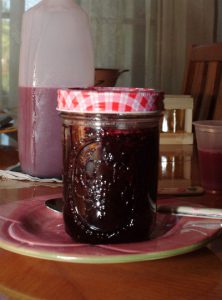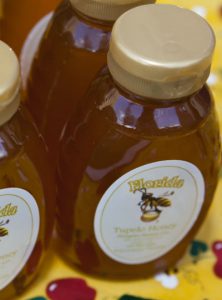The Florida Cottage Food Law of 2011 has opened many opportunities for up-and-coming food entrepreneurs in the state. This allows individuals to manufacture, sell, and store certain types of food products in an unlicensed home kitchen located at a personal residence. With growing interest in local food, the number of cottage food businesses is expected to continuously increase.
Cottage food operators should check
with their city or
county for any additional requirements
that they may have.
What is the Cottage Food Law?
This is a law that allows small-time producers to use an unlicensed home kitchen and its appliances to manufacture/process low-risk foods and sell directly to consumers. The primary goal of the law is to help small-time producers/processors to start a food business with minimal regulatory requirements and/or licenses. The cottage food law applies to human-grade food only, not pet treats. There has been an increased demand for local foods and the law allows individuals to produce and sell non-potentially hazardous foods made in their home kitchens without permit or inspection requirements. Currently, 49 states and DC have their own cottage food law or its equivalent (under different names but with the same intent). Even though cottage food laws from different states have the same primary intent of helping small-sized manufacturers to start their business with minimal regulatory requirements, each state’s cottage food law has different requirements in permit, inspection, or safety training. This article will focus on requirements for Florida cottage food operation(s).
Cottage food operators must review and be knowledgeable about
cottage food operation requirements in their state.
What are the benefits of a cottage food operation?
From the perspective of operators, cottage food can help entrepreneurs start up a new business relatively easily with minimal requirements. For consumers, cottage food operation allows more access to local food(s) in the community. In addition, revenues from cottage food businesses are mostly re-invested locally and often lead to commercial production. Therefore, it can help the local economy by purchasing ingredients from a local supplier and creating job opportunities.
What are examples of cottage foods?
Only not potentially hazardous food products can be sold under the cottage food law. Potentially hazardous foods are a type of food that requires time/temperature control to ensure its safety and limit the growth of pathogenic microorganisms or toxin formation. Therefore, most cottage food products are foods with low moisture that do not need refrigeration for its storage. Examples of cottage food may include breads, popcorn, popcorn balls, honey, cakes, cookies, jams, jellies, baked goods, dried herbs or herb mix, or candy.

What are the labeling requirements?
Cottage food products must be labeled specifically in accordance with the regulatory requirements. The label must be affixed to the food product and needs to contain required information. There are six components that must be included in the labeling: 1) name of the product; 2) name and address of the cottage food business; 3) ingredients of the product with descending order of predominance by weight; 4) net weight or volume of the product; 5) allergen information; and 6) the following statement printed in at least a 10-point font: “Made in a cottage food operation that is not subject to Florida’s food safety regulations.” Nutrition information is required only if you make any nutritional claim (e.g. fat-free, low-sugar).
Does a cottage food operator need to get their kitchen inspected before he/she starts operation?
Cottage food operations require no license or permit and are not inspected by any state government agency; however, the Florida Department of Agriculture and Consumer Services (FDACS) may inspect the kitchen in cases where they receive complaints against any cottage food product or operation.
Where do individuals sell cottage food items?
They may sell cottage foods from their residence directly to the consumer, at farmer’s markets, flea markets and at roadside stands. In addition, cottage food can be sold on the internet; however, the cottage food products cannot be mailed. Products must be delivered directly to the consumer or to the consumer’s private event venue.

How can I learn more about cottage foods and how to start a cottage food business in FL?
FDACS is the government agency that regulates all Florida cottage food operation(s). Detailed information can be found at FDACS’ cottage food website: https://www.freshfromflorida.com/Business-Services/Food-Establishment-Inspections/Cottage-Foods.
There is a lot to learn about cottage foods including the different requirements at local levels, labeling, tax information, and training on food safety to name a few. Contact your local extension office to find out if there are any up-coming programs about cottage food.
References/Resources for Further Information
UF/IFAS Extension Broward County-
http://sfyl.ifas.ufl.edu/broward/family-and-consumer-sciences/
2018 Florida Statutes, Chapter 500-
http://www.leg.state.fl.us/statutes/index.cfm?App_mode=Display_Statute&Search_String=&URL=0500-0599/0500/Sections/0500.80.html
US Food and Drug Administration; Food Code- https://www.fda.gov/food/fda-food-code/food-code-2009
FDACS of Agriculture and Consumer Services Division of Food Safety; Cottage Food Legislation Signed into Law- https://www.freshfromflorida.com/content/download/10223/137606/CottageFoodAdvisoryWithFormNumber.pdf
UF/IFAS Extension, Bottling, Labeling, and Selling Honey in Florida- https://edis.ifas.ufl.edu/pdffiles/IN/IN91800.pdf
 0
0
